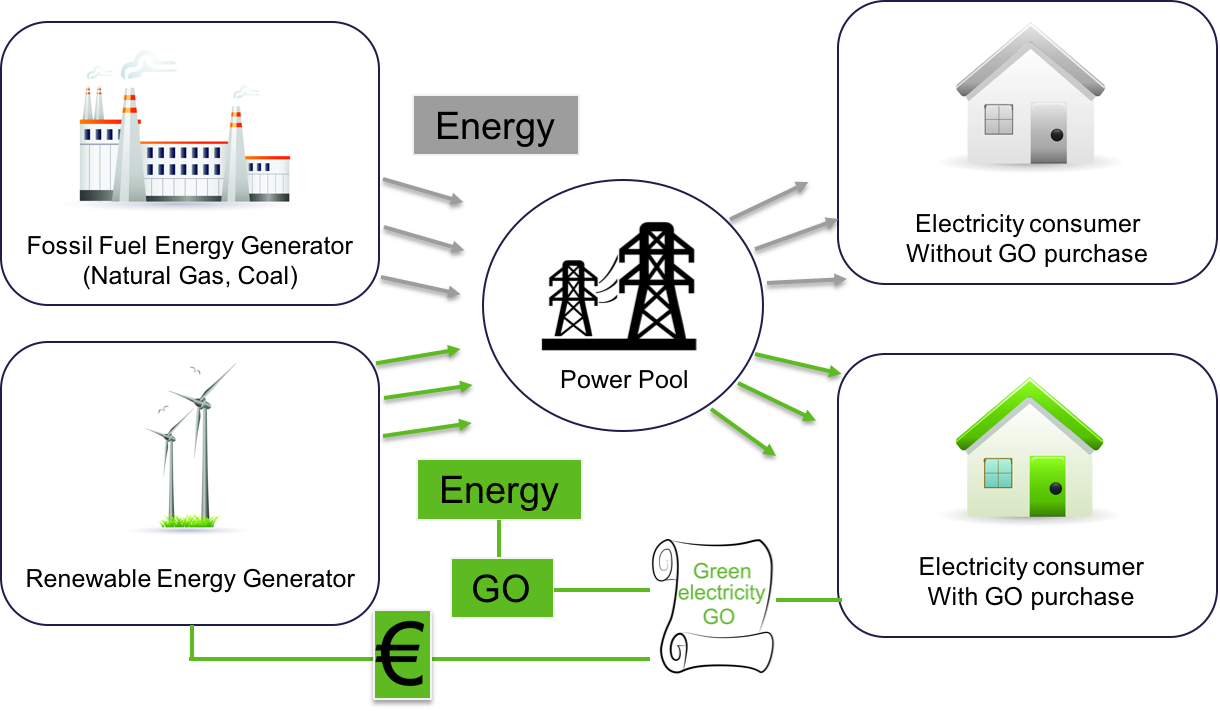Responsible Consumerism in Electricity Market
Responsible consumerism in electricity market is where SDG 12 (Responsible Consumption and Production) and SDG 7 (Affordable and Clean Energy) meet.
Consumers are changing rapidly, as are their preferences. Millennials are going the stage of their lives in which their spend is increasing dramatically. This is reflected in UN Sustainable Development Goals (SDGs) 12, responsible consumption and production. Yet, only 7 percent of them would consider themselves loyal to brands and they start to think and consider causes beyond the old-fashioned values. Many of the 1.8 billion millennials worldwide today associate consumption with higher motives: they are more keenly aware of their health, value the local origin of products, and support the sharing economy [1] [2]. And of course, electricity market is not an exception.
A Guarantee of Origin (GO or GoO) is a tracking instrument defined in article 15 of the European Directive 2009/28/EC and reinforced by European Parliament in Directive (EU) 2018/2001 Article 19. A GO labels electricity from renewable sources to provide information to electricity customers on the source of their energy. Guarantees of origin are the only precisely defined instruments evidencing the origin of electricity generated from renewable energy sources.
The Guarantee of Origin is a voluntary system. It complies with the Greenhouse Gas Protocol Scope 2 [3] Guidance and is an effective and recognized tool to reduce your greenhouse gas emissions and improve your sustainability rating.

As shown in the above figure [4] [5], GOs for electricity are certificates that can be used to verify that electricity has been produced from renewable energy sources or by high-efficiency cogeneration.
An electricity supplier that sells or uses renewable energy in its marketing must certify the origin of the electricity. In the same way, an electricity producer and user that, in its other business, gives its customers information about the origin of the electricity it uses, must verify the proportion of renewable energy sources. Verification takes place by cancelling an amount of guarantees of origin corresponding to the amount of electricity marketed as renewable.
AIB (Association of Issuing Bodies) (https://www.aib-net.org/) satisfies the criteria of objectivity, non-discrimination, transparency and costs effectiveness, in order to facilitate the international exchange of guarantees of origin. Transfers of GOs between AIB member states are carried out via the EECS Hub administered by AIB (https://www.aib-net.org/eecs). AIB’s members are the competent bodies for the administration of Guarantee of Origin schemes in 25 countries ( EU, EEA and Energy Community member states). Three more countries are likely to join by the end of 2020.
In 2019, 707 million certificates (707 TWh) were issued, while 613 million were transferred internationally and 613 million were used and cancelled. The market for electricity GOs continues to grow at about 10% per year.
Individual EU Member States have all been required to take appropriate steps to encourage greater consumption of electricity from renewables which will be redefined after 20-20-20 target expires by the end 2020 [6]. Each State has its own indicative target, depending on issues such as historical experience with renewables.
For the purposes of the RES Directive, energy from renewable sources is defined as "energy from renewable non-fossil sources, namely wind, solar, aerothermal, geothermal, hydrothermal and ocean energy, hydropower, biomass, landfill gas, sewage treatment plant gas and biogases”.
The RES Directive requires Member States to give producers the opportunity to obtain electronic guarantees of origin (GO) for electricity generated from these sources. Member States may also, if they choose, offer GOs for heating and cooling.
GOs provide proof that electricity (or heating and cooling) has been generated from renewable sources (as defined in the RES Directive), specifying the source of the electricity; the dates when it was produced; the identity, location, type and capacity of the production facility; whether the GO relates to electricity or heating or cooling; whether and to what extent the installation has benefited from support; the date when the installation became operational; the date and country of issue; and a unique identification number.
There is no fixed price for a GO, and their value depends on market demand.
The main provisions of the RES Directive concerning GOs are contained in Article 15, which requires Member States to ensure that a GO is issued on request by producers of electricity (and, at the discretion of the Member States, heating or cooling) from eligible renewable energy sources, as defined by the RES Directive. The system is purely voluntary, and individual producers can decide whether or not they wish to make such a request [7].
As described above, GOs’s objectives are two folded; guarantee the origin of electricity produced from renewables and encourage new investments in renewable electricity generation. Based on [8], there are regulatory failures both at national and the European Union levels. Furthermore, due to a contradiction between certain rules in European Union level regulation, consumers receive unreliable information on their electricity consumption mix. Finally, the present framework does not incentivize investments in renewable energy technologies either [8].
References
[3] https://www.linkedin.com/pulse/everything-you-need-know-greenhouse-gas-ghg-emissions-adam-karnama/
[5] https://www.certifhy.eu/79-slideshow/118-what-is-a-guarantee-of-origin.html
[6] https://eur-lex.europa.eu/legal-content/en/TXT/?uri=CELEX%3A32018L2001
[8] https://akjournals.com/view/journals/204/41/4/article-p487.xml
Disclaimer: This article is purely my ideas and reflect and represent my personal views.

This work is licensed under a Creative Commons Attribution-NonCommercial-NoDerivatives 4.0 International License.

